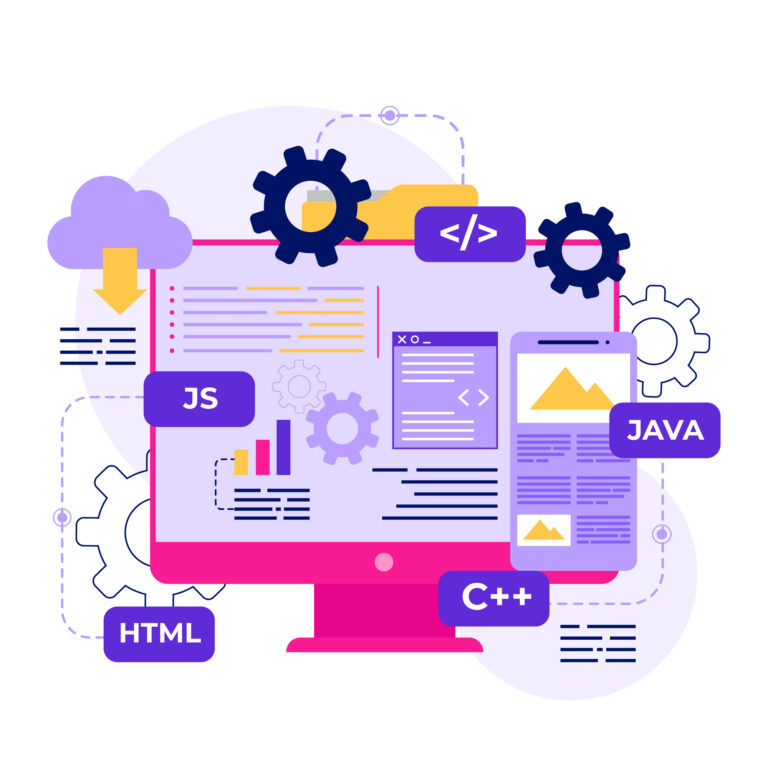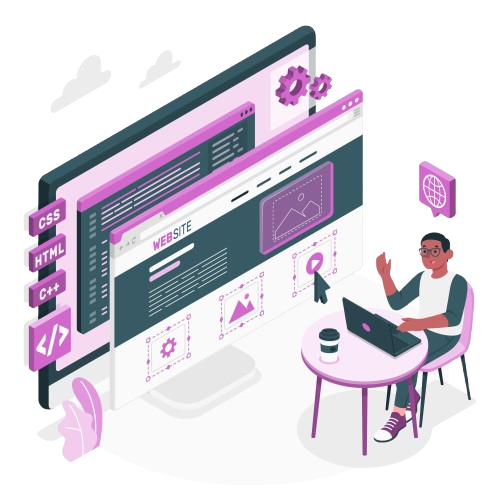Web Development
Web development is the process of building and maintaining functional websites and web applications. It includes both front-end and back-end development using technologies like HTML, CSS, JavaScript, React.js, and Node.js. React.js is used on the front end to create fast, interactive user interfaces, while Node.js powers the back end with scalable, real-time server-side applications. Together, they enable the development of dynamic, full-stack applications. Web developers ensure sites are responsive, secure, and optimized for performance. From simple websites to complex platforms, web development plays a vital role in helping businesses deliver seamless digital experiences and achieve their online objectives efficiently.


Digital Marketing
Digital marketing is the promotion of products, services, or brands using online channels and digital technologies. It includes various strategies like search engine optimization (SEO), social media marketing (SMM), email marketing, content marketing, pay-per-click (PPC) advertising, and affiliate marketing. Businesses use digital marketing to reach their target audience more effectively, increase brand awareness, and drive traffic and sales. Unlike traditional marketing, it offers real-time data, measurable results, and cost-effective campaigns. Whether through websites, social platforms, or email campaigns, digital marketing is essential in today’s digital age to connect with customers, build relationships, and grow a business online.
Mobile App Development
Mobile app development is the process of creating applications for smartphones and tablets. One popular framework is React Native, which allows developers to build cross-platform apps using a single codebase in JavaScript. With React Native, apps can run smoothly on both iOS and Android, reducing development time and cost. It provides a native-like experience with fast performance and access to device features like the camera or GPS. Mobile app development involves UI/UX design, coding, testing, and deployment. React Native is widely used for building scalable, efficient, and user-friendly apps, making it a top choice for modern mobile solutions.

SEO
Search Engine Optimization (SEO) is a strategic process of enhancing a website’s visibility on search engines like Google to attract more organic traffic. In 2025, SEO is not just about keywords but also about user experience, mobile optimization, fast loading speeds, and high-quality content. Effective SEO begins with thorough keyword research, targeting what users are actively searching for. On-page SEO includes optimizing titles, meta descriptions, headings, and content with relevant keywords, while off-page SEO involves building backlinks and social signals to boost credibility.
SEM
Search Engine Marketing (SEM) is a digital marketing strategy that involves promoting websites by increasing their visibility on search engine results pages through paid advertising. Unlike SEO, which focuses on organic rankings, SEM uses paid ads like Google Ads to target specific keywords relevant to a business. Advertisers bid on keywords to display their ads to potential customers actively searching for products or services. SEM helps drive targeted traffic quickly, improve brand awareness, and generate leads or sales. It’s a cost-effective method to reach audiences, with measurable results that allow marketers to optimize campaigns for better performance and return on investment.


SMO
Social Media Optimization (SMO) is the process of enhancing a brand’s presence and visibility on social media platforms like Facebook, Instagram, Twitter, and LinkedIn. It involves creating and sharing engaging content, using relevant hashtags, optimizing profiles, and encouraging user interaction to increase reach and influence. SMO helps businesses connect with their audience, build trust, and drive traffic to their websites. By regularly posting valuable content and responding to comments or messages, brands can improve engagement and grow their online following. SMO is a key part of digital marketing that supports brand awareness, customer loyalty, and long-term online growth.
SMM
Social Media Marketing (SMM) is the use of social media platforms to promote products, services, or brands through both organic content and paid advertising. It involves creating and sharing posts, images, videos, and stories to engage audiences on platforms like Facebook, Instagram, LinkedIn, X (Twitter), and YouTube. SMM helps businesses increase brand awareness, drive website traffic, generate leads, and boost sales. With targeted ads, brands can reach specific demographics based on interests, location, and behavior. Social media marketing also allows real-time communication with customers, building trust and loyalty. It’s an essential tool in any modern digital marketing strategy.


Web Design
Web design involves creating the visual and functional layout of websites using tools and technologies like WordPress, HTML, CSS, and JavaScript. It focuses on UI (User Interface) and UX (User Experience) to ensure websites are visually appealing, user-friendly, and responsive across devices. Designers use platforms like WordPress for easy content management and tools like Figma or Adobe XD for design prototypes. HTML and CSS structure and style the site, while JavaScript adds interactivity. A well-designed website not only attracts visitors but also improves engagement, builds brand credibility, and supports business goals in the digital space through seamless design and usability.
Join Our Team Now

